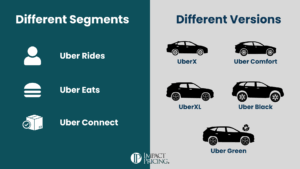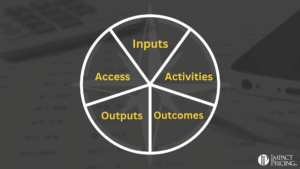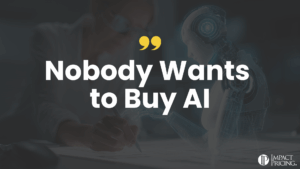You can listen to the full audio version of this blog we call — Blogcast.
Most people think pricing is about math. We build spreadsheets. We run simulations. We talk about cost-plus (ugh) and margins and profit targets.
But pricing isn’t math. It’s psychology.
At its core, pricing is about understanding how people make decisions. And if we want to get better at pricing, we need to get better at understanding people. That’s where empathy comes in.
What Empathy in Pricing Really Means
Empathy is not about being nice. It’s about seeing the world through your buyer’s eyes. What are they trying to achieve? What are they worried about? What would make them feel confident in making a decision?
Every buyer brings their own context to the table, their own problems, goals, and fears. Empathy helps us uncover those things. And once we do, we can design better offers, set better prices, and communicate value more clearly.
In every bootcamp I teach, we spend time figuring out what buyers actually value. We use a Value Table, where we list out solutions, problems, results, and their corresponding value. It’s our way of systematically inserting empathy into pricing decisions. Because empathy isn’t just a mindset. It’s a skill you can build.
Why Empathy is Rare in Pricing
If empathy is so powerful, why don’t more people use it?
First, it’s not taught. Most pricing conversations focus on data and numbers, not on people.
Second, people are too focused on themselves. They think about their costs, their margins, and their targets. They fall in love with their product. But buyers don’t care about your product. They care about their own problems.
Third, empathy feels risky. There’s this fear that if you start thinking about your buyer’s challenges, you’ll feel pressure to lower prices. But real empathy doesn’t weaken your pricing. It strengthens it because now your price makes sense in the buyer’s world, not just your own.
And finally, people assume they already understand their buyers. But unless you’re listening, asking, and adjusting, you’re probably guessing.
False Empathy: When We Project Our Own Fears
One of the most common pricing traps is assuming our buyer thinks like we do.
“I wouldn’t pay that much, so they won’t either.”
That’s not empathy. That’s projection. And it leads to underpricing.
Real empathy means stepping outside your own preferences and looking at the world from the buyer’s perspective. You might hate subscriptions, but they love predictability. You might worry about price, but they worry about failure. You might feel bad about raising prices, but they’d pay more for faster results.
Empathy isn’t about how you would feel. It’s about how they actually feel.
Empathy Improves Strategy
When you price with empathy, you start building strategies that actually work.
You segment more effectively, grouping buyers by what they care about, not by arbitrary traits. You design packages that align with the outcomes your buyers want. And you set prices with confidence, because you understand the value your buyer sees.
Empathy Helps You Communicate Price
Pricing isn’t just a number. It’s a story. And empathy helps you tell the story in a way that makes sense to the buyer.
You highlight the right results. You anchor around their pain points. You speak their language. Suddenly, your pricing page doesn’t feel like a list of fees. It feels like a plan to help them win.
Empathy in the Face of Pushback
When a buyer says “too expensive,” what do you do?
If you react defensively, you tend to discount. If you stay curious, you might uncover the real issue. Empathy helps you listen better and respond with greater insight.
Sometimes, pushback isn’t about price at all. It’s about uncertainty, or timing, or internal politics. Empathy helps you figure that out.
Empathy with Boundaries
Let’s be clear. Empathy doesn’t mean lowering your price to be liked. It doesn’t mean over-accommodating or giving in.
It means understanding your buyer well enough to price in a way that feels fair to them and works for you. Great pricing aligns your value with their goals.
Final Thoughts: Empathy as a Pricing Advantage
Most companies don’t listen. They don’t take the time to understand their buyers. They make assumptions. They guess.
If you’re the one who listens, the one who builds empathy into your pricing process, you win.
Empathy doesn’t weaken your pricing power. It multiplies it.
Share your comments on the LinkedIn post.
Now, go make an impact!
 Tags: pricing, pricing foundations, pricing metrics, pricing skills, pricing strategy, pricing value
Tags: pricing, pricing foundations, pricing metrics, pricing skills, pricing strategy, pricing value













